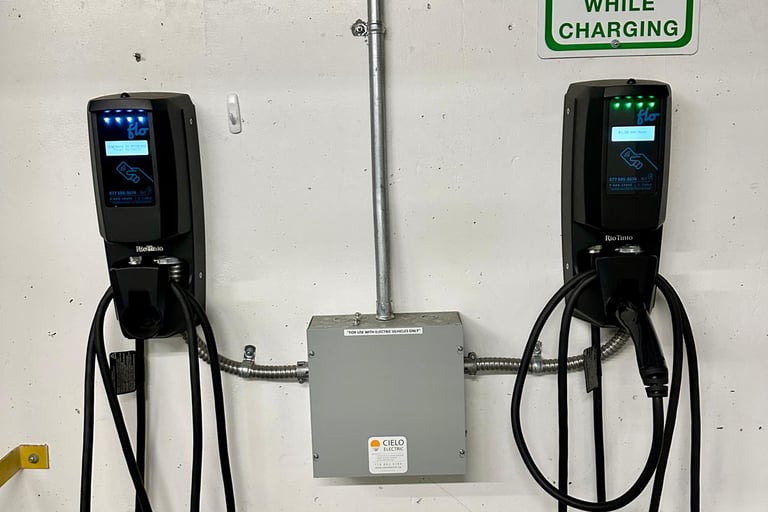
How Much does it Cost to Install an EV Charger at Home?
Not as complicated as you may think.
INDUSTRY


How much does it cost to install an EV Charger at home?
If we're erring on the side of caution and overshooting the costs slightly, we're looking at roughly $2500 for the installation and $1000 for the charger. This includes the costs of the permit and the power logger to measure electricity usage for the last 12 months.
Introduction
This morning, I visited a client on-site with my favourite electrician, and we started talking. He pointed to a house and mentioned that he had provided a quote to the owner for installing a Level 2 EV Charger. He couldn't understand why the owner didn't want to proceed with the project, considering the numerous factors in their favour.
Today, let's review the cost and steps to install an EV charger at home, and discuss the important things to know before moving forward.
Installation
In order to determine the exact cost of the installation for your house, you'll need to schedule an electrician to stop by and provide a quote. They'll need to examine your electrical room and assess your power situation. The amount of power available in your building will play a significant role in determining the cost of the installation. After speaking with my electrician friend, he said that the cost of installation rarely exceeds $2500 at most.
Existing 240v Outlet
If you already have a 240v outlet installed in your garage, then you most likely won't need an electrician to visit your home. The 240v outlet is the same plug your clothes dryer plugs into. Just make sure the charger that you order comes with a cord and plug, not only hardwired.
The Electrician can provide the EV Charger
The charger itself will be substantially less expensive than the installation cost. The charger will probably cost around $1000, but this depends on the model you choose. There are a variety of options available with different features. However, I'd highly recommend a Level 2 charger with networking capabilities, so you can connect it to the internet and track the charging remotely.
BC Hydro - Last 12 Months Meter Data
There may be an additional step required to assess the power situation in your house. The primary concern for the electrician is to ensure that the EV chargers don't overload your electrical system. They will likely request your BC Hydro bills or actual meter usage data from the past 12 months. This way, they can evaluate the average electricity used each month.
BC Hydro - Power Logger
A more accurate way of retrieving this information is by installing a device known as a power logger. Also referred to as an EV power management device, this small tracking device is temporarily installed in your electrical room. It monitors daily electricity usage and identifies peak demand times. The power logger is typically kept in the electrical room for about two weeks. Afterwards, an electrician will retrieve it and download the data to confirm your building's electrical usage.
BC Hydro - Rebates
Keep in mind that BC Hydro may cover up to 50% of the costs of your charger and installation. They also agree with my recommendation to install a "smart charger," which is a charger with internet capabilities, and offer an additional rebate for these chargers. Make sure you review the models that qualify for these rebates on the BC Hydro website here. Remember, you must submit your rebate application within 90 days of installing the EV Charger.
BC Hydro - Peak Rewards Program
Also, not all smart chargers are eligible for this extra rebate. They must meet the "Peak Reward" criteria. BC Hydro has a program where they can control some of your smart devices throughout the year. During peak time events, they'll remotely adjust the smart devices to lower the electrical demand on the grid. You receive an extra $50 if you give them access to do this, but you can always override their controls. In this case, they may delay the start of an EV charger or lower the temperature on your thermostat slightly. To me, an extra $50 isn't worth them having control over my devices, but I'll let you be the judge.
Speed
Speed is important, and when I say speed, I mean kilowatt output. Of course, you'll want to try and get the fastest output possible, but this will largely depend on how much power is available in your house.
Gas Savings
This is why my electrician friend was so baffled. He said that EV drivers are already saving so much money on gas, they might as well put all that saved money towards an EV charger at home. When I was driving a gas car, I was spending about $175 per month on gas. Keep in mind, my car required 91 octane gas, and I’m a salesperson by trade, so I was doing a lot of traveling to visit my clients all over the lower mainland. Across an entire year, the amount I would spend on gas would come close to covering the cost of installing an EV charger at home.
Public EV Charger Savings
Charging at home will be significantly cheaper than charging in public. Public chargers need to make a profit to cover the costs of the EV Charging project, so they add a markup to the cost of electricity. You obviously won't be trying to make a profit from yourself, so the price you'll pay for charging will be the cost of electricity at your home. Additionally, everything is more comfortable at home. If you have to wait for extended periods while your car charges, you might as well make the best of your time by resting at home, spending time with family, or sleeping.
Dedicated Circuit
A dedicated circuit in the panel is usually required for an EV charger. If you don't have sufficient space in your existing panel, you may need to have a sub-panel installed. Most buildings have space on the panel for a dedicated EV charging circuit.
Will this work require an Electrical Permit?
Yes. Installing a Level 2 EV charger at home requires an electrical permit. Your licensed contractor will apply on your behalf. They'll take care of it so you won't need to do anything. There may be an additional fee worked into the project to cover these costs.
Conclusion
Installing an EV charger may seem daunting and expensive at first, but once you look into the details, it's not such a complicated undertaking. The long-term savings and conveniences far outweigh the initial costs. From saving on gas and public charging fees to the comfort of charging your vehicle at home, the benefits are huge. Also, if you can get the government to pay a large portion of the project, there's not much holding you back.
I encourage you to take the leap, and if you need help, I'm here to provide guidance.
Hasta la vista,
Strong Energy








